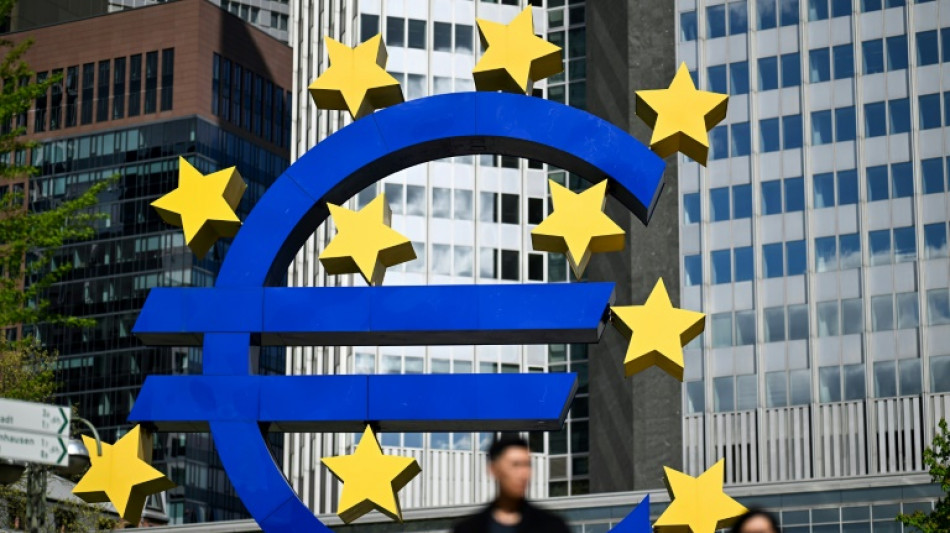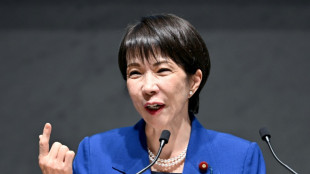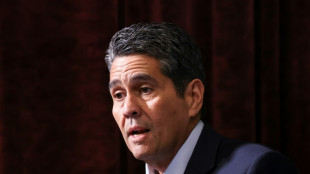
-
 Seoul to ease access to North Korean newspaper
Seoul to ease access to North Korean newspaper
-
History-maker Tongue wants more of the same from England attack

-
 Australia lead England by 46 after 20 wickets fall on crazy day at MCG
Australia lead England by 46 after 20 wickets fall on crazy day at MCG
-
Asia markets edge up as precious metals surge

-
 Twenty wickets fall on day one as Australia gain edge in 4th Ashes Test
Twenty wickets fall on day one as Australia gain edge in 4th Ashes Test
-
'No winner': Kosovo snap poll unlikely to end damaging deadlock

-
 Culture being strangled by Kosovo's political crisis
Culture being strangled by Kosovo's political crisis
-
Main contenders in Kosovo's snap election

-
 Australia all out for 152 as England take charge of 4th Ashes Test
Australia all out for 152 as England take charge of 4th Ashes Test
-
Boys recount 'torment' at hands of armed rebels in DR Congo

-
 Inside Chernobyl, Ukraine scrambles to repair radiation shield
Inside Chernobyl, Ukraine scrambles to repair radiation shield
-
Bondi victims honoured as Sydney-Hobart race sets sail

-
 North Korea's Kim orders factories to make more missiles in 2026
North Korea's Kim orders factories to make more missiles in 2026
-
Palladino's Atalanta on the up as Serie A leaders Inter visit

-
 Hooked on the claw: how crane games conquered Japan's arcades
Hooked on the claw: how crane games conquered Japan's arcades
-
Shanghai's elderly waltz back to the past at lunchtime dance halls

-
 Japan govt approves record 122 trillion yen budget
Japan govt approves record 122 trillion yen budget
-
US launches Christmas Day strikes on IS targets in Nigeria

-
 Australia reeling on 72-4 at lunch as England strike in 4th Ashes Test
Australia reeling on 72-4 at lunch as England strike in 4th Ashes Test
-
Too hot to handle? Searing heat looming over 2026 World Cup

-
 Packers clinch NFL playoff spot as Lions lose to Vikings
Packers clinch NFL playoff spot as Lions lose to Vikings
-
Guinea's presidential candidates hold final rallies before Sunday's vote

-
 BondwithPet Expands B2B Offering with Custom Pet Memorial Product
BondwithPet Expands B2B Offering with Custom Pet Memorial Product
-
Best Crypto IRA Companies (Rankings Released)

-
 Eon Prime Intelligent Alliance Office Unveils New Brand Identity and Completes Website Upgrade
Eon Prime Intelligent Alliance Office Unveils New Brand Identity and Completes Website Upgrade
-
Villa face Chelsea test as Premier League title race heats up

-
 Spurs extend domination of NBA-best Thunder
Spurs extend domination of NBA-best Thunder
-
Malaysia's Najib to face verdict in mega 1MDB graft trial

-
 Russia makes 'proposal' to France over jailed researcher
Russia makes 'proposal' to France over jailed researcher
-
King Charles calls for 'reconciliation' in Christmas speech

-
 Brazil's jailed ex-president Bolsonaro undergoes 'successful' surgery
Brazil's jailed ex-president Bolsonaro undergoes 'successful' surgery
-
UK tech campaigner sues Trump administration over US sanctions

-
 New Anglican leader says immigration debate dividing UK
New Anglican leader says immigration debate dividing UK
-
Russia says made 'proposal' to France over jailed researcher

-
 Bangladesh PM hopeful Rahman returns from exile ahead of polls
Bangladesh PM hopeful Rahman returns from exile ahead of polls
-
Police suspect suicide bomber behind Nigeria's deadly mosque blast

-
 AFCON organisers allowing fans in for free to fill empty stands: source
AFCON organisers allowing fans in for free to fill empty stands: source
-
Mali coach Saintfiet hits out at European clubs, FIFA over AFCON changes

-
 Pope urges Russia, Ukraine dialogue in Christmas blessing
Pope urges Russia, Ukraine dialogue in Christmas blessing
-
Last Christians gather in ruins of Turkey's quake-hit Antakya

-
 Pope Leo condemns 'open wounds' of war in first Christmas homily
Pope Leo condemns 'open wounds' of war in first Christmas homily
-
Mogadishu votes in first local elections in decades under tight security

-
 Prime minister hopeful Tarique Rahman arrives in Bangladesh
Prime minister hopeful Tarique Rahman arrives in Bangladesh
-
'Starting anew': Indonesians in disaster-struck Sumatra hold Christmas mass

-
 Cambodian PM's wife attends funerals of soldiers killed in Thai border clashes
Cambodian PM's wife attends funerals of soldiers killed in Thai border clashes
-
Prime minister hopeful Tarique Rahman arrives in Bangladesh: party

-
 Pacific archipelago Palau agrees to take migrants from US
Pacific archipelago Palau agrees to take migrants from US
-
Pope Leo expected to call for peace during first Christmas blessing

-
 Australia opts for all-pace attack in fourth Ashes Test
Australia opts for all-pace attack in fourth Ashes Test
-
'We hold onto one another and keep fighting,' says wife of jailed Istanbul mayor


ECB's digital euro sparks flurry of online misinformation
European Central Bank president Christine Lagarde's recent remarks on a "digital euro" prompted a fresh wave of misinformation online, highlighting an uphill battle ahead to convince the public of the project's merits.
The decision to create a digital euro -- essentially an electronic form of cash backed by the ECB -- has not been made yet and any possible launch would be years away.
But when Lagarde in a press conference this month referenced an October 2025 deadline for moving to the next stage of preparations, social media lit up with alarmed messages that the launch was imminent.
Harald Vilimsky, a member of the European Parliament from Austria's far-right Freedom Party (FPOe), was among those posting that the ECB "wants to introduce the digital euro in October", an incorrect claim that spread in several languages.
The claim was echoed on X by Nicolas Dupont-Aignan, the eurosceptic head of the Rise Up France party, who added that the project was "madness for our freedoms".
Other widely shared posts repeated misconceptions that have long dogged the project: that a digital euro would mean the "end of cash" or be used for financial surveillance, allowing the ECB to "block" or "track" payments or "access savings".
"Your money will no longer be yours," alleged a French TikTok video shared more than 15,000 times.
The falsehoods circulating online reveal a broader "mistrust of centralised institutions", said Vicky Van Eyck, executive director of campaign group Positive Money Europe.
Recent comments by French President Emmanuel Macron and European Commission chief Ursula von der Leyen about investment needs were similarly misused in viral posts that falsely claimed people's savings would be taken from them.
- 'Strategic autonomy' -
The ECB and dozens of other central banks worldwide are exploring or putting in place central bank digital currencies (CBDCs) as cash use declines.
Conspiracy theories about governments planning cashless societies as way of controlling citizens have proliferated since the Covid-19 pandemic, but ECB officials have been at pains to stress that a digital euro would complement cash -- not replace it.
Issued by the ECB, the money would be risk-free. It would be held in a digital wallet and payments could be made online or offline, allowing for cash-like anonymity. The ECB says it would not be able to directly link transactions to specific individuals.
In making the case for a digital euro, the ECB argues that it would bolster Europe's "strategic autonomy".
A digital euro would allow for direct money transfers between users, offering a pan-European payment service that could reduce reliance on US payment giants such as Mastercard, Visa, Apple Pay or PayPal.
"This dependence exposes Europe to risks of economic pressure and coercion," ECB chief economist Philip Lane warned last week, in a nod to transatlantic tensions under US President Donald Trump.
Lane said a digital euro could also counter the influence of increasingly popular dollar-backed "stablecoins" -- private digital currencies that are pegged to the US dollar and could undermine the euro if widely adopted in Europe.
- Challenges -
Some observers remain critical.
Ignazio Angeloni, a former ECB official and currently a fellow at Milan's Bocconi University, said Europeans already had "a plethora" of easy payment options and weren't necessarily looking for another.
For now, the digital euro discussions were still at a fairly technical stage, Angeloni said, and many members of the public were "not interested".
Van Eyck said interest could be hindered by plans to cap how many digital euros consumers could hold.
An ECB report published in March found that between 2022 and 2024, awareness about the digital euro jumped from 18 to 40 percent among eurozone survey respondents. The potential willingness to use it remained below 50 percent.
The decision to issue a digital euro will only come once European Union legislation is in place, but progress in Brussels has been slow.
If adopted, a digital euro would be introduced from mid-2027 or 2028 at the earliest, officials told AFP.
Good communication with the public will be key to its success, said Van Eyck.
"The big issue with not having the public on board is that the digital euro could flop," she said.
M.King--AT


